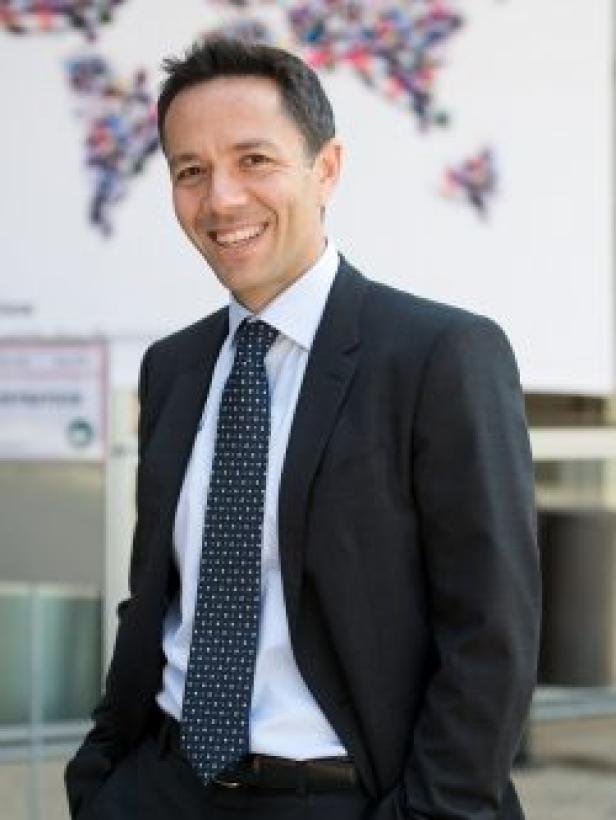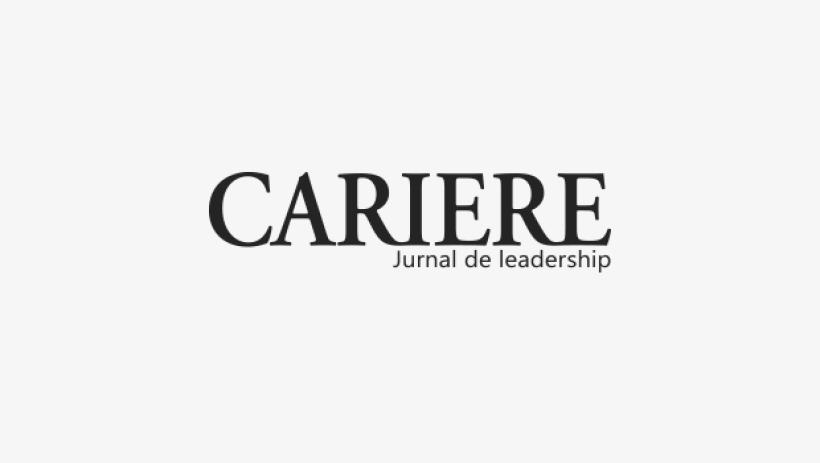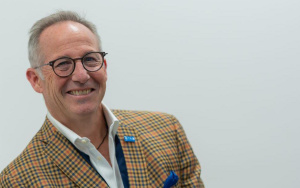 Gianpiero Petriglieri is an Associate Professor in the Organizational Behaviour department of the INSEAD business school. His award-winning courses and research focus on leadership development. In 2017 he was included in the Thinkers50 list of the most influential management thinkers in the world. Gianpiero Petriglieri is interested in developing leadership in the era of "nomadic professionalism".
His research has been published in Administrative Science Quarterly, Academy of Learning & Education and Organization Studies. His essays and articles have been featured in Harvard Business Review, on the BBC, Financial Times, The Economist, The Wall Street Journal, BusinessWeek and Forbes.
In April, 2018, Gianpiero Petriglieri held a Master Class in Bucharest called: „Competence is not enough: The development of trustworthy leaders in the era of nomadic professionalism”, organized by HR Club.
Gianpiero Petriglieri is an Associate Professor in the Organizational Behaviour department of the INSEAD business school. His award-winning courses and research focus on leadership development. In 2017 he was included in the Thinkers50 list of the most influential management thinkers in the world. Gianpiero Petriglieri is interested in developing leadership in the era of "nomadic professionalism".
His research has been published in Administrative Science Quarterly, Academy of Learning & Education and Organization Studies. His essays and articles have been featured in Harvard Business Review, on the BBC, Financial Times, The Economist, The Wall Street Journal, BusinessWeek and Forbes.
In April, 2018, Gianpiero Petriglieri held a Master Class in Bucharest called: „Competence is not enough: The development of trustworthy leaders in the era of nomadic professionalism”, organized by HR Club.
Gianpiero Petriglieri speaks about modern leadership and nomadic professionalism
Felicia Luca
Times are changing, fast and significantly.
Our work has become central to our lives and it is increasingly personal. We look for work that feeds our passion, expresses who we are and serves a higher purpose. This requires a change in leadership. We need leaders who connect with their team, and who understand, represent and meet the aspirations and interests of the people they are leading.
About all of this and more we have talked to Gianpiero Petriglieri - Associate Professor in the Organizational Behaviour department at INSEAD business school.
Work has become so much more personal and central to the way we live. As you so insightfully put it, today’s careers are less like ladders, and more like works of art. Talk to us about what this means for people and how it transforms the work environment.
It means that for many people, work is the primary means to discover, express, and develop themselves. We find out who we are at work, we make statements about who we are through our work, and we grow in our work. To find and do work that serves all those functions is exciting, it makes us feel free, authentic, and in charge of our careers. It is also hard, and unsettling. When it gets personal, work can fill us with passion as well as with doubts. If what I do is who I am, for example, what happens when people don’t like or buy my work, or when I can no longer do that work? Negative feedback, or setbacks, can hit people very deeply.
It also means that the workplace is less a source of directions and constraints, and more a source of opportunity and anxiety, an open field in which we can carve our very own path, but also in which we might constantly fear taking the wrong turn or getting lost altogether. For that reason, one thing I have found is that the organization that help us sustain the sense that we can be ourselves at work, and do our best work, are the most attractive. We remain loyal to those, but not because they make us feel secure—no organization can do that these days. We remain loyal because they make us feel free more than they make us feel scared.
You talk about hunters and explorers, as being the main players in the modern professional world. Tell us who they are, and how they complement each other. What are some misconceptions about each type?
These are just metaphors for two distinct approaches we can take towards the inevitable uncertainty of careers in the new world of work. The “hunters” anchor their careers to a specific goal and focus on finding the best way to achieve it. The “explorers” anchor their careers to a certain way of being at work and focus on finding places to sustain it. Both approaches make us feel in charge of our career progression and reduce the uncertainty that comes from figuring out what you want to do, where you want to be, and whether you can get there. They are ways to organize our working lives when organizations don’t do it for us.
To use the metaphor of careers as art again, they are different genres. You can paint a masterpiece in both, and most of us probably take both approaches at different times in our lives. You just can’t take both at the same time because they will pull you in opposite directions, psychologically and practically.
The most common misconception is that these are fixed types. They are not. Another is that hunters only care about external rewards, positions, and incentives, and explorers are navel-gazing, self-absorbed people. Neither is true. The former can be very reflective, and the latter extremely focused on their tasks.
What is nomadic professionalism and how does it impact leadership?
Nomadic professionalism is an experience of our working life that is becoming ever more common, and more culturally influential. It is a combination of feeling deeply attached to your work, while at the same time loosely attached to organizations. A sense that your work defines you more than your company does, your productivity more than your title. That you can take your work with you, if you need to, across different places. It’s a psychological experience as much as a social trend. Perhaps you stay in your company for 25 years, but if you feel “I need to keep myself employable, I want to do work that I can take with me” for all those years, you are a nomadic professional.
The impact of nomadic professionalism on leadership development is profound. Most of our leadership development approaches are based on the assumption of corporate citizenship. You belong, just like everyone else who we hired, so let us help you find a way to stand out lead. But for nomadic professionals, as I said earlier, belonging cannot be taken for granted, neither their own nor anyone else’s. So leadership development needs to focus on building connections, of the kind that make people feel they have something in common worth protecting and pursuing, something other than their independence.
Traditional leadership is about standing out, modern leadership is about staying connected. What are the main benefits and challenges of each?
The main benefit of traditional leadership, the kind best represented by the “visionary” who stands out in a crowd, is that it is clear and motivating. You know where those leaders stand, and where they want to go, and you can love or hate them, follow or resist them. The challenge is that they often paint a simplified view of the world—these are our friends and these are our foes, this is right and this is wrong. The same thing that makes them inspiring can at times make them stubborn and inflexible, especially, as it often happens, when their ideas become beliefs, and can’t be questioned without serious consequences.
The main benefit of the more contemporary leadership, the kind best represented by the “connectors” that brings and holds together a diverse movement, is that it is inclusive. It invites and makes room for different views and different stories within the space people share. The challenge is that their positions can sometimes feel too complex and unclear—we want this and also that, we are ready to change our mind. The same thing that makes them inclusive can at times make them hard to pin down, and open to the accusation that everything goes.
You say the leadership crisis is, in fact, a crisis of legitimacy. What is at the root of this crisis and how can this challenge be overcome?
The same thing that is at the roots of every leadership crisis, in every time and place. A loss of connection between the concerns, aspirations, experiences, and fates, of those who claim to lead and those who are meant to follow. If you do not understand what I worry about and what I hope, if you don’t have much in common with me, and your success is not my success, you’re not just a bad leader. You are not a leader at all. The challenge can be overcome by rebuilding those connections, or finding leaders who can credibly claim them.
What does it take to be a legitimate leader today?
The same that it has always taken. Being able to tell the truth, even the hard truths, without making people lose hope. Understanding their concerns and aspirations. Painting a credible picture of a better future. And having the skills to not just paint that picture of how we might escape our worries and achieve our hopes. But to make that picture become reality.
Knowing how informative and empowering self-awareness is, can one be born a leader but never become one?
Absolutely. I should first say that no one is born a leader. Not in the biological sense at least. Leaders are born from groups. If you lack the consciousness of your story and ability, it is very hard to take the mantle of leadership when the opportunity comes. That is, when a group—small or large—could be inspired by your story and empowered by your ability. Self-awareness helps put ourselves out there with courage and clarity, take considered risks, and seek out others who might help us understand and improve our selves. Those are all things that leaders need to emerge and to last. Obliviousness is a great risk for leaders, and for those who follow them too. And it is always around the corner, especially when you feel too secure.
As you beautifully put it, you cannot be Picasso if you are not handy with brushes. What is a meaningful brushstroke you love to teach leaders today?
The brushstroke of leadership is the conversation. It is through many conversations, as a leader, that you bring your masterpiece into the world. Like brushes, they come in different sizes and you must use them all at different times. I focus on three conversations in particular in my workshop with emerging and established leaders.
One is the conversation we are constantly having with ourselves, about who we are and who we are not, about what is and is not possible.
The second is the conversation we have with other people, about what we are doing and how, who we are becoming and what good is it.
And the third is the conversation we have with our institutions, about what needs to change, and what needs to remain the same, in their cultures and performance.
If you are not aware of how you are having those conversations, and if you can’t change those conversations, it is impossible to understand and manage yourself, others, and organizations. Hence it is impossible to lead. Great leaders are usually the people who shift the content and tone of all three conversations at once.
 Gianpiero Petriglieri is an Associate Professor in the Organizational Behaviour department of the INSEAD business school. His award-winning courses and research focus on leadership development. In 2017 he was included in the Thinkers50 list of the most influential management thinkers in the world. Gianpiero Petriglieri is interested in developing leadership in the era of "nomadic professionalism".
His research has been published in Administrative Science Quarterly, Academy of Learning & Education and Organization Studies. His essays and articles have been featured in Harvard Business Review, on the BBC, Financial Times, The Economist, The Wall Street Journal, BusinessWeek and Forbes.
In April, 2018, Gianpiero Petriglieri held a Master Class in Bucharest called: „Competence is not enough: The development of trustworthy leaders in the era of nomadic professionalism”, organized by HR Club.
Gianpiero Petriglieri is an Associate Professor in the Organizational Behaviour department of the INSEAD business school. His award-winning courses and research focus on leadership development. In 2017 he was included in the Thinkers50 list of the most influential management thinkers in the world. Gianpiero Petriglieri is interested in developing leadership in the era of "nomadic professionalism".
His research has been published in Administrative Science Quarterly, Academy of Learning & Education and Organization Studies. His essays and articles have been featured in Harvard Business Review, on the BBC, Financial Times, The Economist, The Wall Street Journal, BusinessWeek and Forbes.
In April, 2018, Gianpiero Petriglieri held a Master Class in Bucharest called: „Competence is not enough: The development of trustworthy leaders in the era of nomadic professionalism”, organized by HR Club.
 Gianpiero Petriglieri is an Associate Professor in the Organizational Behaviour department of the INSEAD business school. His award-winning courses and research focus on leadership development. In 2017 he was included in the Thinkers50 list of the most influential management thinkers in the world. Gianpiero Petriglieri is interested in developing leadership in the era of "nomadic professionalism".
His research has been published in Administrative Science Quarterly, Academy of Learning & Education and Organization Studies. His essays and articles have been featured in Harvard Business Review, on the BBC, Financial Times, The Economist, The Wall Street Journal, BusinessWeek and Forbes.
In April, 2018, Gianpiero Petriglieri held a Master Class in Bucharest called: „Competence is not enough: The development of trustworthy leaders in the era of nomadic professionalism”, organized by HR Club.
Gianpiero Petriglieri is an Associate Professor in the Organizational Behaviour department of the INSEAD business school. His award-winning courses and research focus on leadership development. In 2017 he was included in the Thinkers50 list of the most influential management thinkers in the world. Gianpiero Petriglieri is interested in developing leadership in the era of "nomadic professionalism".
His research has been published in Administrative Science Quarterly, Academy of Learning & Education and Organization Studies. His essays and articles have been featured in Harvard Business Review, on the BBC, Financial Times, The Economist, The Wall Street Journal, BusinessWeek and Forbes.
In April, 2018, Gianpiero Petriglieri held a Master Class in Bucharest called: „Competence is not enough: The development of trustworthy leaders in the era of nomadic professionalism”, organized by HR Club.






